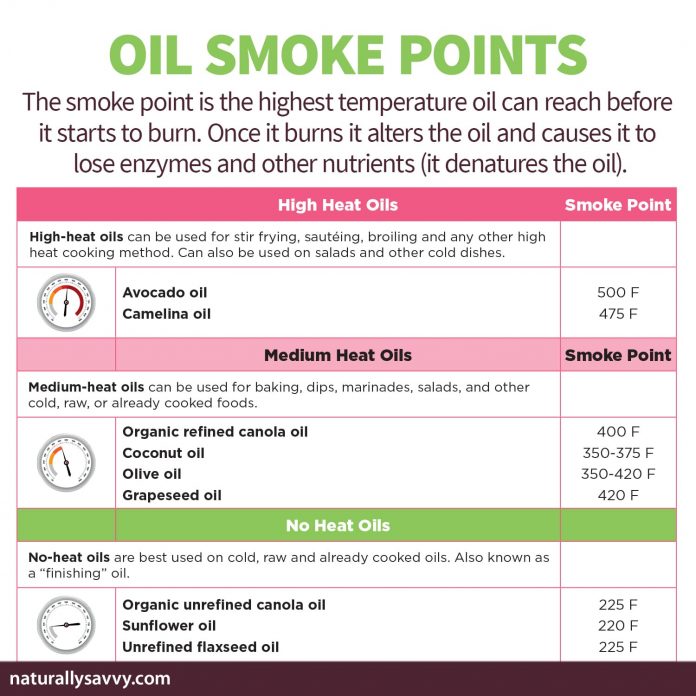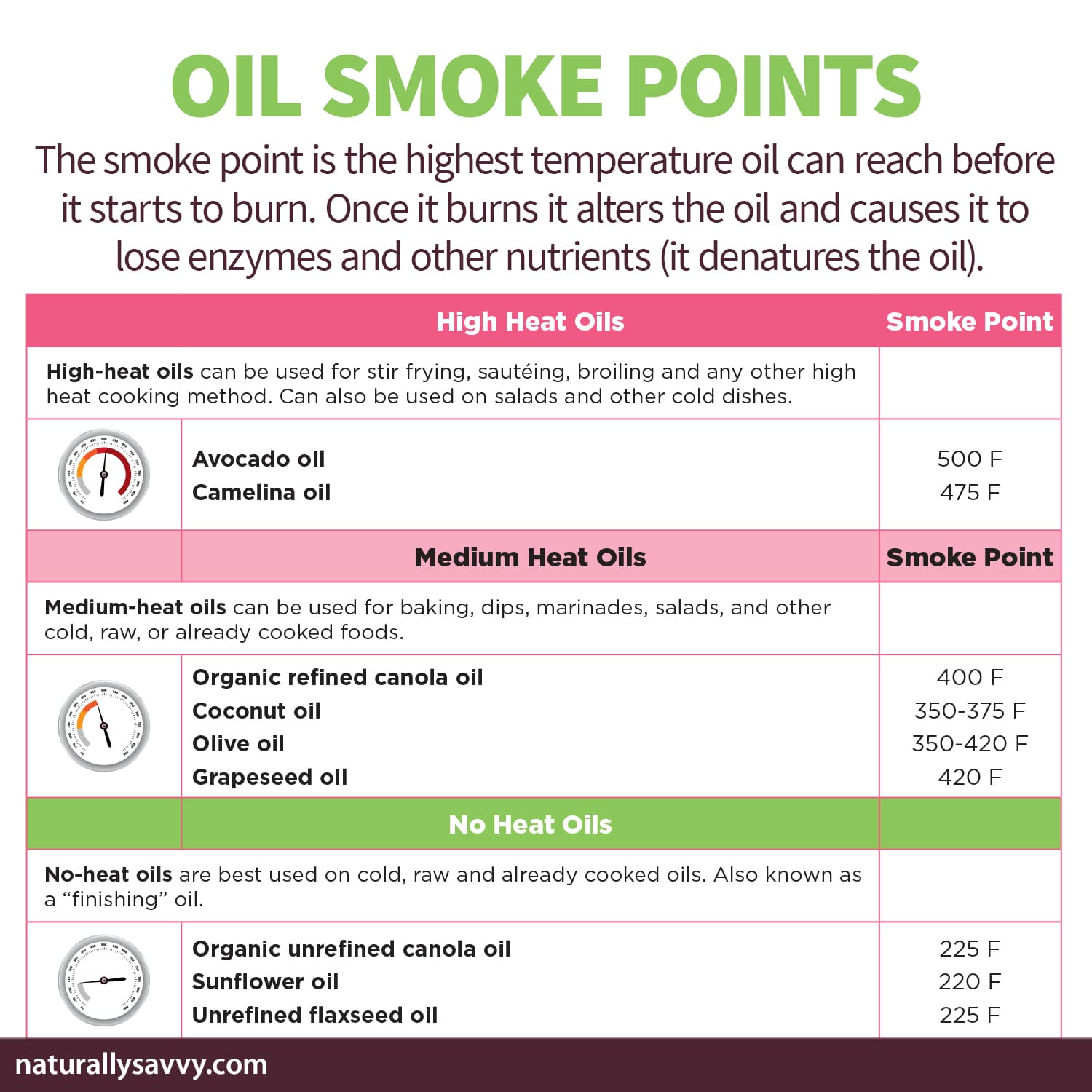
The oil aisle at the grocery store can be a bit overwhelming. With smoke points, refined and unrefined, it can be hard to decide between olive, avocado, and coconut-just to name a few! Each oil has unique health benefits, flavors, and uses.
What is the smoke point?
The smoke point is the highest temperature oil can reach before it starts to burn. Once it burns it alters the oil and causes it to lose enzymes and other nutrients (it denatures the oil). Ingesting burnt oil creates free radicals in our body which can result in inflammation and signs of aging. It's important to select the right oil for the job based on its smoke point and how you want to use it. 
Refined versus unrefined oils
The refining process can drastically change the oil. Canola oil, for example, comes refined and unrefined. Refined canola oil has a smoke point of 400 F, but chemicals like bleach or hexane are used to extract the oil. Organic, unrefined canola oil has a smoke point of 200 F, steam is used to extract the oil, and is also free of GMOs.
Types of oils and how to use them
Avocado oil
Avocado oil is one of our favorite new oils at Naturally Savvy. It’s made from the fleshy part of avocados and is now being used in many products including mayonnaise and potato chips. It is one of the few oils we can eat that doesn’t come from a seed.
Smoke point: 500 F (one of the highest smoke points for cooking oils)
How to use: You can use this versatile oil for everything! You can fry an egg, bake cookies, roast veggies, and stir-fry with it. It's also delicious on salads.
Health benefits: We need fat in our diets, and it's important to choose the right oils. We want “good fat” as opposed to bad fats like trans fats. Avocado oil is high in oleic acid, a monounsaturated fat. Avocado oil is good for our heart, our eyes, it’s a good source of vitamin E, and it helps our body absorb nutrients like carotenoids that need fat to help with absorption.
Read more about good fats and bad fats
Camelina oil
This oil comes from the camelina sativa seed, an ancient oilseed grown in Saskatchewan, Canada. The seed is part of the brassica family-the the same family as broccoli, cauliflower, and kale!
Smoke point: 475 F
How to use: You can use it to roast vegetables, in soups, and drizzled on pizza. Its high smoke point means it's also good for searing fish and topping pasta. It’s also cold-pressed, which means the oil isn’t heated when it’s produced.
Health benefits: Camelina oil is high in omega 3’s and vitamin E. It contains a unique type of vitamin E called "gamma-tocopherol" that allows the oil to stay stable while cooking.
Watch Andrea break down the smoke points, uses, and health benefits of different oils:
Subscribe to our YouTube Channel.
Canola oil
Canola is a popular vegetable oil is made from the rapeseed plant. It's used in many packaged products as well as restaurants.
Smoke point: 400 F refined, 225 F unrefined
How to use: Canola is good to cook and bake with, but as we mentioned above, it's important to purchase organic, unrefined canola oil to avoid chemicals and GMOs.
Health benefits: Canola contains omega 3’s and oleic acid and is mostly made up of monounsaturated fats.
Coconut oil
We love coconut oil and all its many health benefits and uses! Look for oils that are labeled cold-pressed and virgin. If you don't love the smell or taste, you can even get flavorless coconut oil from companies like our partner Barlean's, which deodorizes the oil without the use of chemicals.
Smoke point: 350-375 F
How to use: Eat it straight from the container with a spoon, put in your shakes, morning coffee or golden milk, or use in baking. It's also delicious on popcorn.
Health benefits: Coconut oil is a good type of saturated fat that contains medium-chain triglycerides (MCTs). It is being studied for heart and brain health, it increases our metabolism (so it’s great for weight loss), and it lowers bad cholesterol.
Read 9 more ways to use coconut oil
Olive oil
Olive oil also referred to as “liquid gold,” is made from olives and comes from different parts of the world like Greece, Morocco, Tunisia, Spain, and Portugal. Italy is the largest exporter.
There are many different types of olive oil available at the grocery store: Extra virgin, virgin light, and pure. Stay away from olive oil that says “pure” on the label. It is the lowest quality and could even be mixed with other oils.
Extra virgin is the gold standard. It means there are no defects in the olives used to produce the oil. It is the least processed and contains the most nutrients (antioxidants, polyphenols, tocopherols, etc). Make sure the oil is cold-pressed, which means it's the least processed. If the oil smells rancid or like crayons, it has gone bad-don't eat it.
Smoke point: 350-420°F
How to use: Use expensive olive oil for dipping bread, dressings, dips, and cold dishes. Use less expensive olive oil for cooking things like kale chips, but still, make sure it is extra virgin or virgin.
Health benefits: It contains antioxidants that help to reduce oxidative stress (those pesky free radicals). It has a compound called oleocanthal that mimics ibuprofen at reducing inflammation and pain, so it’s great for people who suffer from painful conditions like arthritis.
Read how olive oil can make you feel fuller
Sunflower oil
Sunflower oil is made from sunflower seeds and should be used as a finishing oil since it has one of the lowest smoke points. Sunflower oil can be high in linoleic oil (a polyunsaturated fat) or oleic oil (monounsaturated fat). Polyunsaturated fats can because inflammation, so look for sunflower oil that’s high oleic like this one from Dr. Mercola which contains higher amounts of monounsaturated fats.
Smoke point: 220°F
How to use: This oil is great in dips, topping your cold pasta, or on a bean salad.
Health benefits: As long as you get an oil that's high in oleic, the monounsaturated fats make it similar to olive oil-good for your heart, anti-inflammatory, and high in vitamin E.
Here are some other oils to consider:

Buy these oils from Amazon:
Macadamia Nut Oil
Almond Oil
Rice Bran Oil
Sesame Seed Oil
Pumpkin Seed Oil
Read next:
What You Should Know about MCT Oil and Fats
Healthy Fats That Don't Make You Fat
DISCLAIMER: This article contains affiliate links, which means that if you click on one of the product links, Naturally Savvy will receive a small commission so we can keep pumping out amazing articles like this one. Thank you so much for your support!










